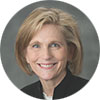Download PDF

By Ruth D. Williams, MD, Chief Medical Editor, EyeNet
Thank you for taking a chance and reading a new editor’s first Opinion piece. I suppose I’ve been preparing my whole life to assume this role of writing a monthly column. Reading the paper was a quotidian event when I was a child, except, unlike most children, I didn’t read the comics first; I went straight to “Ask Ann Landers.” My mother would have promptly canceled the newspaper had she known her 10-year-old was reading about noncommittal boyfriends, shrewish mothers-in-law, cheating wives, and mean coworkers. The leading advice columnist of the 1960s, Ann Landers (Esther Lederer) boldly served up suggestions and guidance on complex problems, making herself an expert through the sheer audacity of offering her opinion. I was entranced.
In more recent years, my favored reading has been from the editorial pages of magazines and newspapers. I’ve learned from a broad swath of opinionators, including Gail Collins, Nicholas Kristof, David Brooks, George Will, and Anna Quindlen. In the foreword to his recent book, The Road to Character, New York Times columnist David Brooks described his work as an editorial writer: “I’m paid to be a narcissistic blowhard, to volley my opinions, to appear more confident about them than I really am, to appear smarter than I really am, to appear better and more authoritative than I really am.” Dear colleague and reader, I will take the risk of sharing my perspectives with you, and please know it is a frightening thought to put my musings into print before you.
I hope to be direct, provocative, and timely, and to discuss our ophthalmic issues with equal measures of gravitas and spark. Above all, I hope to be practical. EyeNet is #1 in High Readership among ophthalmic periodicals. One reason is that EyeNet presents pragmatic information about clinical ophthalmology and about day-to-day practice challenges. I am, after all, a private practitioner. As president of an independent ophthalmology group of 38 physicians, I strategize every day about how we ophthalmologists can thrive during this 21st-century revolution in health care, and I’d like to share that with you.
Many ophthalmologists have anxiety related to the rapid changes in the broader health care environment. I will address some of the common questions that quietly unsettle ophthalmologists. Can my practice remain independent? How can we maintain access to patients as narrow networks become more popular? How can I keep up with all the mandatory quality reporting, not just for CMS but also for the private payers and the health systems? Everyone talks about increasing efficiency, but I’m already efficient; what more can I do? How can our practice survive with constant, incremental reimbursement decreases, while our expenses continue to increase? How can a small practice have a voice when the insurance companies, health systems, pharmaceutical companies, and pharmacies are consolidating into gigantic, sophisticated businesses?
These are the kinds of questions I grapple with daily. I’d like to initiate a conversation with you, the EyeNet readers. Writing thoughts down and collaborative discussion are among the best mechanisms for learning and growth. Let’s do both. I welcome your letters and emails (eyenet@aao.org). I’d love to hear your suggestions for Opinion pieces.
Before concluding this first essay, I must bow in respect before my colleague, mentor, and friend, Dick Mills. For 14 years, EyeNet readers have turned to Dick’s Opinion column, often as the first stop upon opening the magazine. Using engaging real-life stories and trenchant humor, he seduced us into reading about serious topics. In his long run of columns, Dick was unfailingly articulate and used the English language with beauty and precision.
But Dick Mills gave us more than a thoughtful critique of our ophthalmic world—he offered himself. In a moving Opinion in July 2013, Dick wrote about his personal journey of illness and medical complications, and how that makes him deeply grateful for every single day. Today, I am deeply grateful for him. Together, let’s raise a toast to the “Andy Rooney of ophthalmology,” our own Dick Mills.